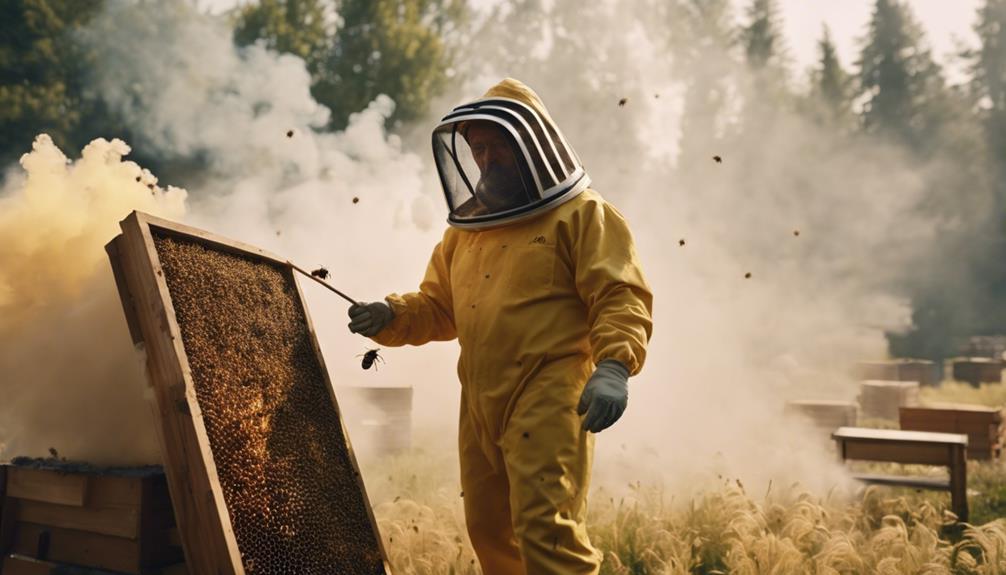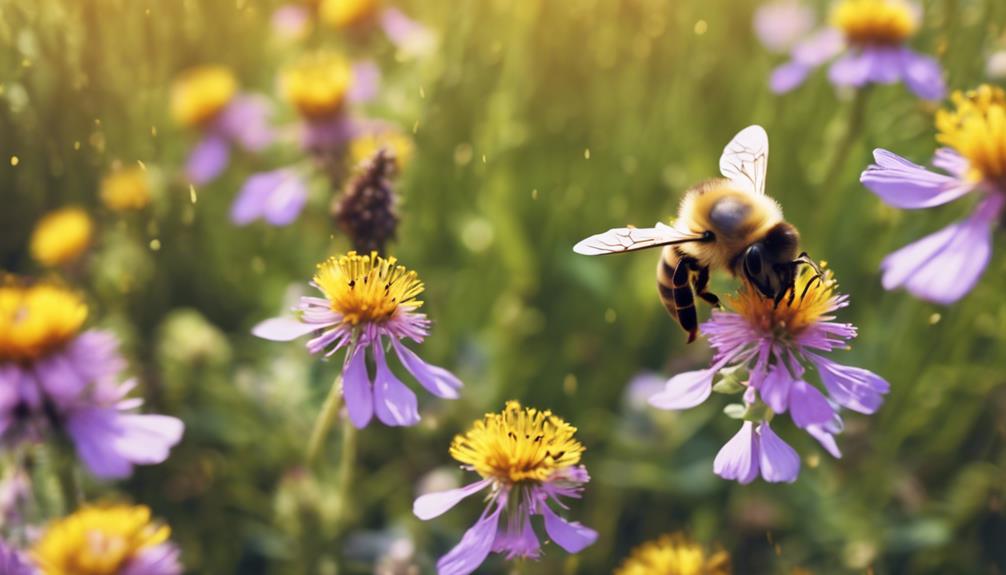Using too much smoke on bees can cause increased aggression, disrupt hive activities, and even set back colony development. It’s essential to strike the right balance when using a bee smoker to guarantee the well-being and success of your bees. Monitoring the amount of smoke, observing bee behavior, and considering hive sensitivity are pivotal steps in avoiding excessive smoke. By understanding the risks of overusing a smoker and adhering to beekeeper guidelines for smoke usage, you can create a calm environment for your bees while maximizing their health and productivity.
Main Points
- Excessive smoke increases aggression in bees.
- Overuse disrupts hive activities and inspections.
- Risk of stings and harm to bee health.
- Some hives may require requeening.
- Finding the right balance is crucial for bee well-being.
Effects of Excessive Smoke on Bees
Excessive smoke usage on bees can lead to increased aggression and harm to the hive‘s activities due to the hot smoke produced by rapid bellows pumping. Bees, like us, don’t appreciate being smoked out of their homes excessively.
When we use too much smoke, it can stress them out, disrupt their daily buzz, and even set back their progress. Imagine someone blowing hot air in your face while you’re trying to work – not cool, right? Well, it’s the same for bees.
They get annoyed, their routines get messed up, and they might need extra time to recover. So, let’s be mindful of our smoke levels and keep our bee buddies happy and productive without overwhelming them with excessive smoke.
Signs of Overusing Bee Smoker
Using an excessive amount of smoke in beekeeping can lead to various signs indicating overuse of the bee smoker. Bees may react to smoke by becoming agitated and more aggressive, disrupting hive inspections and increasing the risk of getting stung. While smoke usually calms the bees, too much can have the opposite effect, causing them to be unresponsive or disoriented.
If bees show little response to the smoke despite repeated exposure, it could be a sign that they need requeening. Additionally, an excessive amount of smoke can displace bees from their combs, making it harder to locate the queen during hive management. Understanding how bees react to smoke and adjusting the amount used accordingly is essential for successful and safe beekeeping practices.
Risks of Too Much Bee Smoker
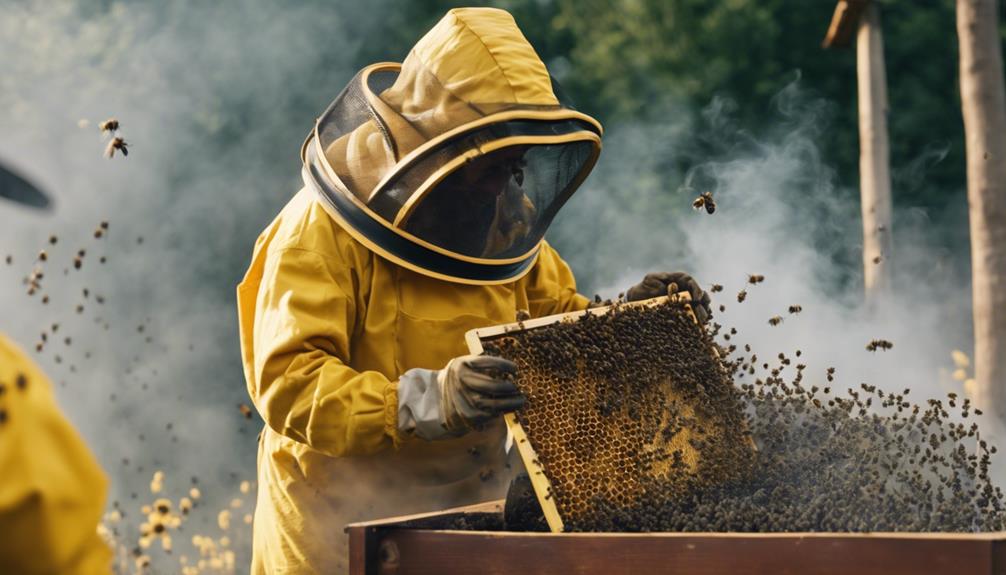
Using too much smoke on bees can pose health risks for the insects, potentially leading to increased aggression or harm from hot smoke.
Additionally, the impact on bee behavior could disrupt their normal activities and set back colonies.
This excessive smoking might also affect honey production, highlighting the importance of monitoring smoke use carefully to maintain hive health.
Health Risks for Bees
In some cases, an abundance of smoke when working with bees can pose health risks for the bees themselves. Excessive smoke may lead to aggressive behavior in bees, disrupting the harmony within the hive. The hot smoke produced by rapid bellows pumping can stress and harm the bees, setting back the entire colony’s productivity.
Bee sensitivity to smoke varies, with some hives needing requeening if they don’t respond well. Additionally, using too much smoke can displace bees from their combs, making it difficult to locate the queen and disrupting the overall organization of the hive. It’s essential to find a balance when using smoke to ascertain the bees’ health and well-being while working with them.
Impact on Bee Behavior
When excessive smoke is applied during beekeeping, it can trigger heightened aggression in the bees, potentially disrupting hive dynamics and productivity. Bees, like us, have their limits, and over-smoking can really rile them up.
Imagine someone setting off smoke alarms in your home constantly; you wouldn’t be too pleased either. This sensitivity to smoke varies among hives, so it’s essential to pay attention and not just smoke them out without a care.
If bees start ignoring the smoke, it might be time for a new queen to rule the hive. Ultimately, bee behavior is intricately linked to the amount of smoke they’re exposed to.
Effects on Honey Production
Excessive use of smoke during beekeeping can adversely impact honey production. This disruption can occur by disrupting foraging patterns and causing bees to consume more honey, ultimately reducing overall yield.
When bees are exposed to too much smoke, they can get stressed, affecting their ability to gather nectar and make honey efficiently. This stress can lead to a decrease in the amount of honey produced by the colony.
Additionally, high levels of smoke may trigger increased aggression in bees, which can further hinder hive productivity.
To guarantee maximum honey production, it’s crucial to manage smoke levels carefully. By allowing bees to work undisturbed and maintain their natural foraging patterns, beekeepers can support the bees in their essential honey-making process. Balancing the use of smoke is key to ensuring optimal hive productivity.
Impact of Excessive Smoke Exposure
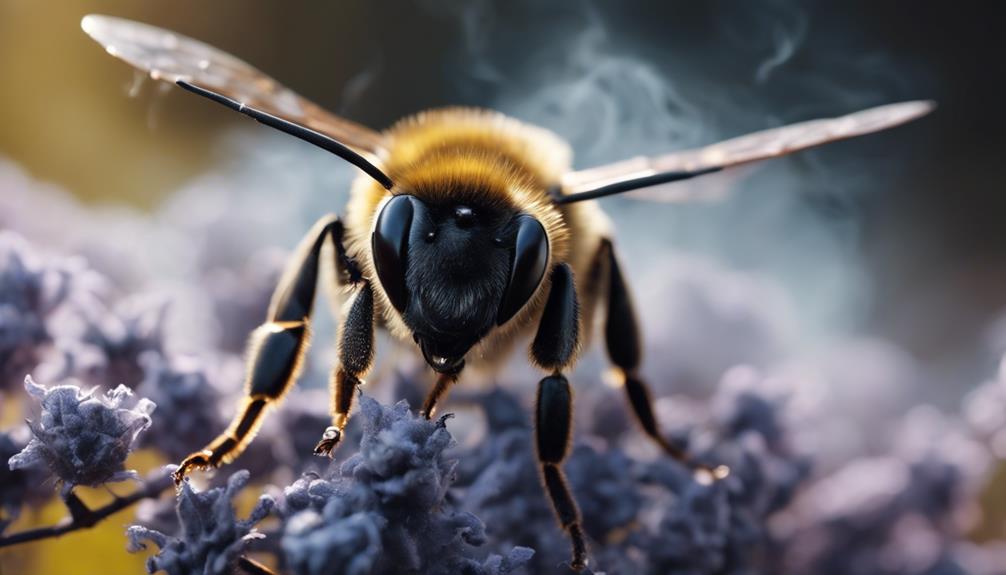
Using too much smoke around bees can lead to increased aggression and potential harm to the colonies. Bees have a fire chamber in their bodies designed to keep the hive safe, but overuse of smoke can disrupt their natural processes.
Some hives may remain calm even with excessive smoke, while others show sensitivity and react adversely. The hot smoke from rapid bellows pumping can harm bees, setting back the entire colony.
If bees become unresponsive to excessive smoke, it might be necessary to requeen the hive to restore harmony. Understanding the balance between using smoke as a tool and overusing it’s essential for the well-being of the bees and the success of beekeeping endeavors.
Finding the Right Balance With Smoke
To maintain the well-being of bees and guarantee successful beekeeping, achieving the right balance with smoke is essential for harmonious hive management. When it comes to using smoke around bees, finding the perfect equilibrium is key. Here are some important points to keep in mind:
- Monitor the amount: Using just enough smoke without overdoing it can help keep the bees calm and cooperative.
- Observe bee behavior: Pay attention to how the bees react to the smoke to adjust your usage accordingly and prevent unnecessary aggression.
- Consider hive sensitivity: Different hives may respond differently to smoke, so it’s vital to tailor your approach based on their reactions.
- Avoid excessive smoke: Overuse of smoke can have negative repercussions, setting back the progress of your bee colonies.
Beekeeper Guidelines for Smoke Usage
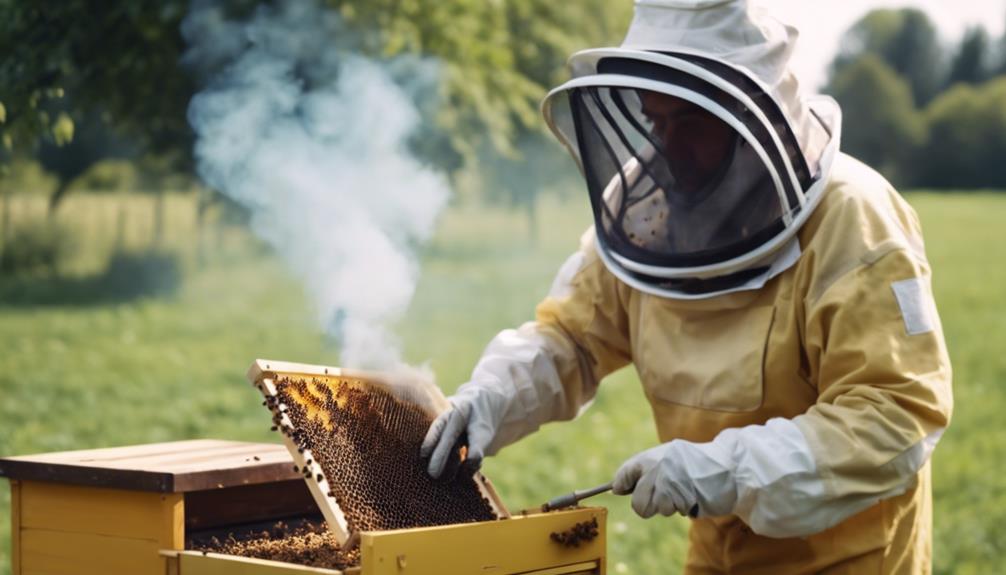
Finding the right balance with smoke is essential for beekeepers to effectively manage their hives and guarantee the well-being of their bees. When using a smoker, it’s important to bear in mind that less is often more. Opt for cool smoke by utilizing materials like dried pine needles or burlap rather than generating hot smoke that can harm the bees. Understanding the types of smoker fuel and their effects on bees is key.
Excessive smoke can lead to aggressive behavior in bees and even set back the colony’s progress. Always observe how your bees react to smoke; some hives may be more sensitive than others. If bees show signs of being unresponsive to excessive smoke, it might be time to contemplate requeening for their well-being.
Consequences of Using Excessive Smoke
Excessive smoke usage can lead to increased aggression in bees, potentially disrupting hive activities and setting back colony development. When too much smoke is used, it’s like adding fuel to a fire; the bees get riled up, and it can be a real challenge to calm them down.
Hot smoke from rapid bellows pumping can harm not only the bees but also the delicate hive structure. The repercussions of over-smoking can be far-reaching, causing a setback in colony productivity and growth. Sensitivity to smoke varies among hives, so it’s essential to find the right balance.
Tips to Avoid Smoke Overuse
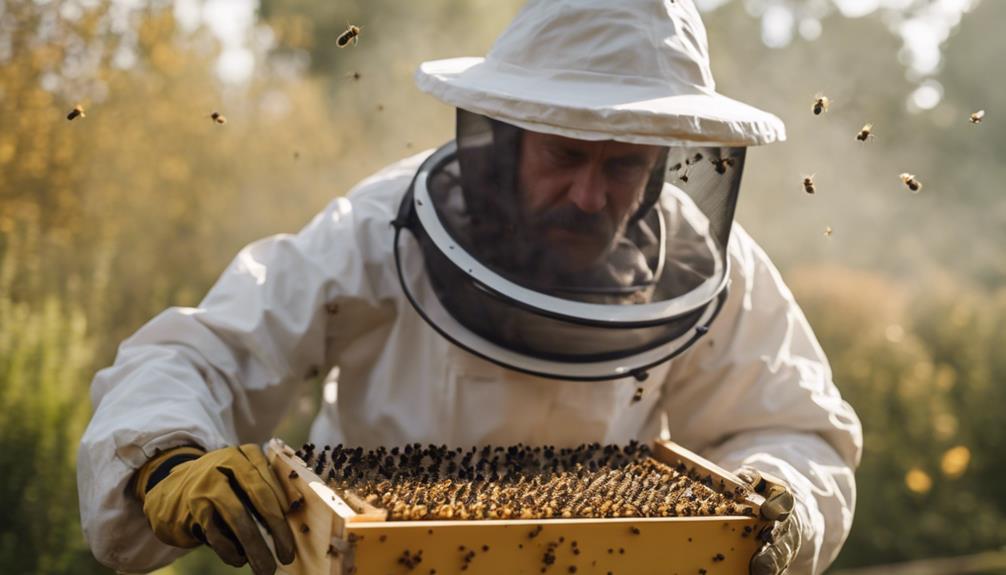
Let’s investigate how to avoid using an excess of smoke when dealing with bees. When working with these amazing creatures, it’s important to find that sweet spot with smoke – just enough to keep them calm without overdoing it.
One tip is to focus the smoke on the entrance of the hive rather than saturating the whole area. This way, the bees get a gentle hint rather than a full-on cloud.
Additionally, consider using smoke masks to minimize the smell of smoke on your hands and clothes, making you less likely to trigger defensive responses.
Being mindful of the amount of smoke and its impact on the bees, especially the guard bees, can help maintain a harmonious environment for both the bees and your comb honey production.
Harmful Effects of Excessive Smoke
Using too much smoke when dealing with bees can lead to increased aggression and harm the bees’ behavior and overall health. Excessive smoke is like pouring fuel on a fire – it can set bee colonies back and disrupt their delicate hive behavior.
Imagine trying to have a peaceful conversation with a friend while someone blows smoke in your face – bees feel the same sensitivity. Some hives may need a new queen if they don’t respond well to smoke, needing a fresh start.
Bees, when overwhelmed by smoke, can act out – becoming agitated, disoriented, and showing disruptive behavior. It’s essential to find the right balance to keep our buzzing friends happy and healthy.
Importance of Moderation in Smoker Application
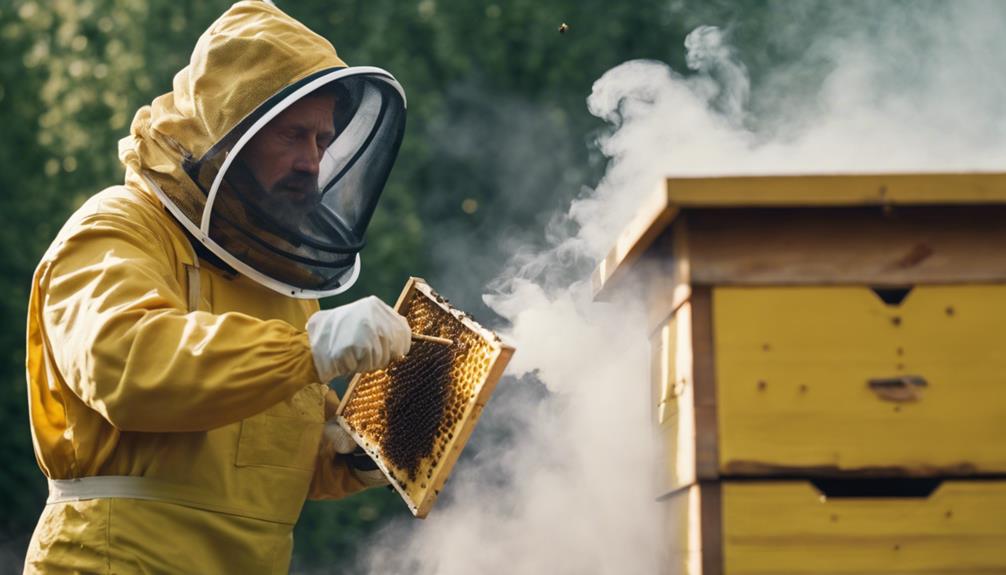
Moving away from the detrimental effects of excessive smoke, one must take into account the influence of moderation in applying smoke to bees for their well-being and hive harmony.
Bee health hinges on proper smoke management. Bee sensitivity varies, with some colonies needing requeening if unresponsive to smoke. Using just enough smoke guarantees safety without causing harm. It’s like adding a pinch of spice to a recipe; moderation is key.
When we master the art of smoker application, we create a calm environment for our buzzing friends to thrive. Remember, bees are delicate creatures, and our actions directly impact their world. So, let’s adopt moderation and proper management to foster a harmonious relationship with these essential pollinators.

Hello! My name is Noel Calvin. I graduated from UCLA and now work as a writer at Launch Ninjas. I write blog posts that inspire and guide our readers in their entrepreneurial pursuits. I live in Pleasantville, NJ, with a peaceful yet lively atmosphere that inspires me.
Writing stories is more than just a job for me. It allows me to share my observations and satisfy my curiosity about the world. I combine my analytical skills with creative enthusiasm to delve into technology trends and startup stories. But my life isn’t limited to screens and keyboards. I value loyalty, passion, and a touch of old-fashioned charm, which I infuse into every narrative I create.
I love spending time in my garage, jamming with my band when I’m not writing. Playing the guitar and singing bring me immense joy. I also enjoy capturing ordinary and extraordinary moments through my camera lens and exploring new culinary adventures that excite my taste buds. I’m always seeking new experiences.
My family is very important to me. Joyful Sunday brunches filled with laughter and intense board game nights keep me grounded, reminding me of life’s simple pleasures.
In my world, every moment is an opportunity for discovery. Every discovery is a story worth sharing, whether a heartfelt moment at home or the pulse of technological innovations. Join me as I navigate through life, one blog post, one guitar strum, and one heartwarming family dinner at a time.
